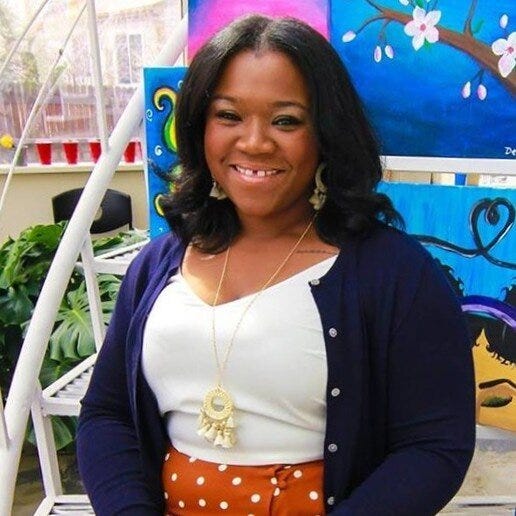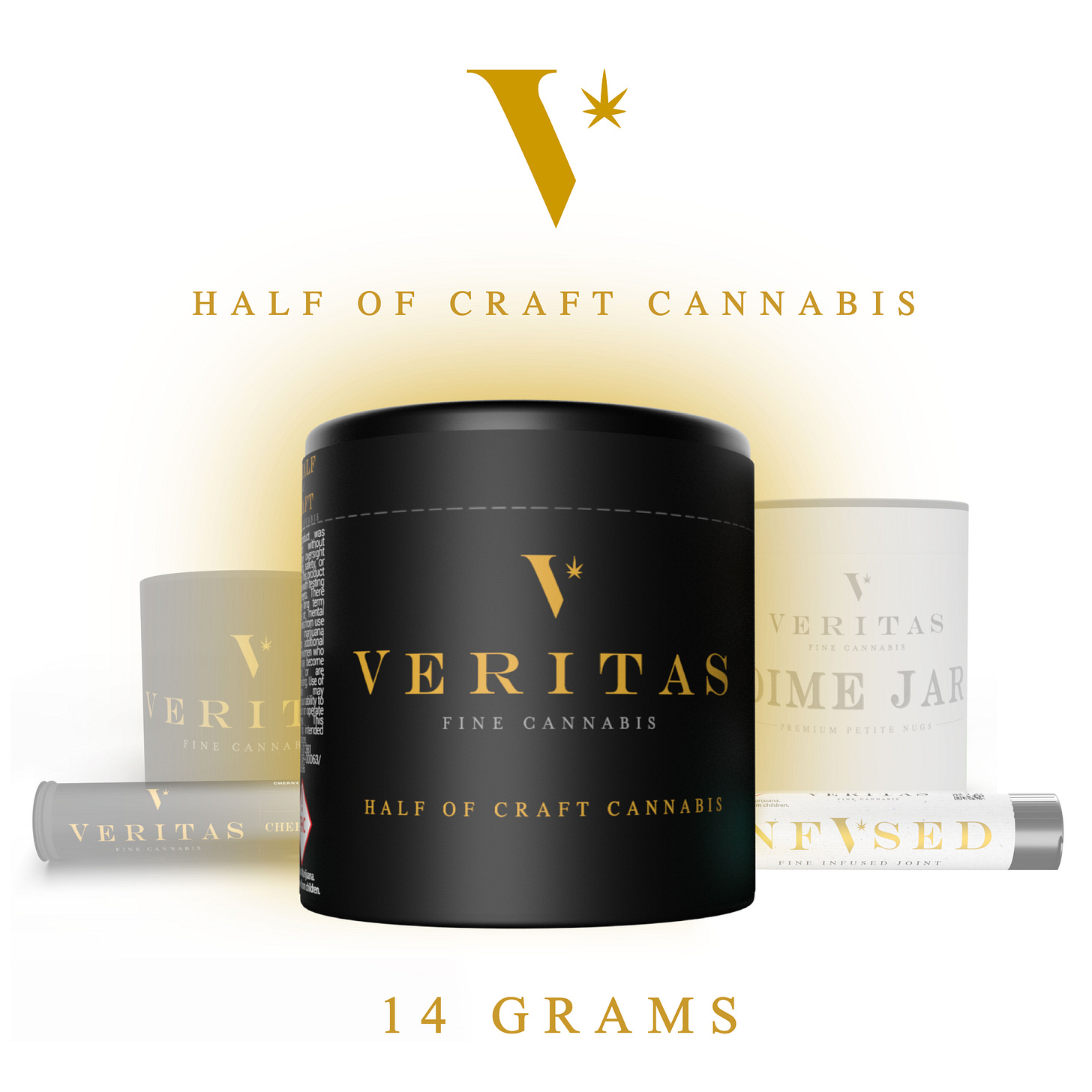
This new MIP could be a social-equity force multiplier — here’s how
And inside the Legislative debate over hemp-derived intoxicants with Christian Sederberg
Welcome to another edition of Regulated State! Thanks for letting me hit your inbox.
It’s a relatively slow week in Colorado cannabis news, what with the MAPS conference, Pride and all. But I still have some great conversations for you to check out, a new Social Equity Spotlight with a beverage manufacturer whose product was born out of both joy and tragedy, a new drop from Veritas Fine Cannabis, and some proper news briefs too.
Speaking of Pride: I was at the parade last weekend — which was amazing as always. But the lack of cannabis brands representing stood out to me like a sore thumb. Did I miss any? Let me know so I can give them a shout!
And, here’s a white paper on the state of LGBTQ representation within the cannabis industry that I wrote last year.
This is also the first regularly scheduled newsletter to implement a paywall. As promised, the overall format has stayed the same, but I’ve saved some juicy bits for those of you willing to cough up $5 a month to get the real inside scoop.
No matter what, I appreciate you taking the time to read. It’s a pleasure.
Did somebody forward this to you? Are you ready to upgrade your subscription? 👇🏼👇🏼👇🏼Subscribe
Let’s do it, starting with some quick hits:
California-based Jetty Extracts, a cannabis manufacturer, is expanding its Solventless product collection to Colorado, marking its third U.S. market entry. Touting its one-gram Live Rosin Vape free of fillers and cutting agents, Jetty is partnering with Colorado cultivator and retailer Leiffa for the launch. The expansion follows a successful debut in New York, according to a press release. Jetty's Solventless products, available in a range of strains, can be found at several Colorado dispensaries with more to come in the next months. Further Jetty product lines are set to roll out in late 2023.
Boulder-based Wana Brands, meanwhile, just doesn’t stop making moves. This time, its targeting new customers over the summer with product innovations, unique events and over $15,000 in premium giveaways. They’ll be promoting their “Quick” line of products — the two most recent of which utilize minor cannabinoids to relieve stress and “address a range of recreational and wellness goals,” according to the company. Wana plans to expand its audience by participating in non-traditional cannabis industry events and launching a nationwide "Enhance Your Summer" sweepstakes. For each Wana purchase until Labor Day, consumers can enter to win prizes, including a $10,000 dream vacation or equivalent cash.
In the meantime, the Canadian MSO that paid nearly $300 million for the rights to purchase Wana Brands isn’t doing so hot. A quick analysis of their 2023 fiscal year earnings report is near the end of the newsletter.
How a new MIP could be a social-equity gamechanger and force multiplier

Sarah Woodson is an advocate, an executive and entrepreneur who owns or leads three (soon to be four) businesses. And just weeks ago, she announced that she’s signed the lease on a 9,000-square-foot “turnkey” cannabis manufacturing facility, or MIP, in Denver proper through her organization The Color of Cannabis.
She recently took the time to chat with me about the why of it all, and how she envisions it working out
FWIW: Her other businesses include My Cannabis Tours — the first ever licensed cannabis bus that promises a “high-flying” experience as it makes stops at dispensaries offering exclusive deals and discounts, along with roundtrip airport transportation. The Color of Cannabis helps aspiring social-equity entrepreneurs learn the complex ins and outs of Colorado cannabis compliance and laws, while Kush & Canvases offers a place to toke up and make great (or not so great) art.
That fourth business? It’s a “small CBD store” that will soon celebrate its grand opening, Woodson said.
“Essentially, I'm always trying to find ways for people to actually open their businesses,” Woodson told me over the phone. “There's a lot of organizations that help. I consider us to be the best in our market, and I stand on that. But as a business owner, I have an additional insight and I know what the challenges are.”
One of the biggest challenges she noted was the cost of space, especially for folks who were looking to start infused-products businesses. And many of the entrepreneurs she works with are young in their roles — first-timers — and some are a little gun-shy when it comes to working with landlords. She would show up with them to important meetings as the executive director of The Color of Cannabis, which carries some weight.
But the costs: $10,000, $12,000, $15,000 — “astronomical amounts,” as she puts it, were just too high.
“I know that a $15,000 overhead in a space where it's gonna take you about six to seven months to even get licensed, it's just not — it’s not possible,” Woodson told me. “The people that I work with don’t have that type of capital.”
So when this facility became available, she couldn’t let the opportunity pass by.
It’s a plan more than a year in the making, Woodson said.
She approached the Colorado Marijuana Enforcement Division with a novel approach that would allow each separate space inside a manufacturing facility to be addressed individually so that it counts as a physical location to meet the state’s rules surrounding licenses. A cannabis manufacturing license must have a physical location tied to it.
“They came back and they were like, ‘Yeah, we think it’s possible.’”
The MED and Denver’s Excise and Licenses department, which regulates cannabis in the Mile High City, have been a tremendous help, she said.
One promising location fell through — a misfortune that “devastated” her and her fellow entrepreneurs.
“I was like, ‘You guys, don’t worry. You know, hang in there. It’s the long game.’”
And then the “completely turnkey” location showed up and things are happening.
The Color of Cannabis has an office space on site. They share the costs of doing business — rent, security, compliance, software — with four other businesses currently, and two more on the way.
And compliance is key: If products want to be transferred between spaces in the building, they must complete a Metrc manifest just like any other businesses moving cannabis. The space is unique, but the rules are universal (at least in Colorado).
“What we've created is essentially almost like a coworking space where everyone's covering the overhead, but everyone's an individual business — and when you step out of the door, it's like you're stepping out on the street,” Woodson told me.
Most of the four businesses that have committed to working out of the new space will be familiar to my readers: C’est la vie Coffee, owned by Nicholas Goodwin; La Vida Dulce, founded by founded by husband-and-wife duo Desiree and Dijonn Duran; Strain16, owned by Jamana Jamison (keep reading to meet her and her company); and resin manufacturer Monster Melts, who I haven’t yet had the pleasure of speaking to.
One of the more exciting aspects of this whole thing to me, personally, is the scalability of it. Each entrepreneur can use their space to host an accelerator program — a function created by the state that allows a “accelerator-endorsed licensee” to “host” a social-equity licensee on their licensed premises.
That means, technically, that this space for six businesses actually has the potential to launch 12 social-equity companies. It’s a big move. A big deal.
Only one established cannabis company — Smokey’s Cannabis Co. in Trinidad — has offered their space as an accelerator host, Woodson told me, while all of her current tenants have made a commitment to act as accelerators.
“And that is something that's doable, and that is something that will help people get their business started and hopefully operational,” Woodson said.

Why Sarah Woodson is done with the term “social equity” — and inside the stakeholder process to even the playing field for cannabis delivery drivers.
Paid subscribers get access to bonus content, intelligence and insights. $5. Sign up today!Subscribe
Inside the compromise hemp-intoxicants bill with Christian Sederberg

While I’ve spent a lot of time in this newsletter focused on the social-equity side of this past Legislative session (also: see above), a bill potentially just as important to the cannabis industry — both reputationally and economically — passed with a quieter, but just as serious, debate.
Senate Bill 23-271 tackled the proliferation of hemp-derived intoxicants, or often chemically modified extracts such as delta-8 THC. These intoxicating chemicals, federally legalized through the 2018 Farm Bill and essentially unregulated, are being sold at natural-food stores and gas stations across the country.
In Minnesota, these products arguably led to the full legalization of adult-use cannabis. But anecdotally, I’ve spoken to people who’ve had some seriously dark, scary experiences consuming the supposed same product by the same brand that once gave them a great high.
And as a matter of fact, more than 100 “reports of adverse events in patients,” over half of which required emergency medical services (such as hospitalization), have been reported to the U.S. Food and Drug Administration since Dec. 1 2020.
In Colorado, the first state to regulate the sale of adult-use cannabis, this posed a potential problem — both to the status and health of the already-struggling traditional cannabis sector, and to hemp farmers and extractors who were making a product technically legal.
“We definitely had at the beginning, I would say, sort of two camps — trusting, but looking at the other side thinking, ‘OK, this is the cannabis industry; they're trying to protect their business.’ [and] ‘This is the hemp industry; they're trying to protect and expand their business, and this is all about money,’” VS Strategies Partner Christian Sederberg told me during a recent video call. “But pretty quickly, we all agreed that this was really about public safety.”
Sederberg was in the room as an industry leader who represented both camps that both worked hard to find compromise, he said.
He pointed to other leaders, like the Stanley brothers of Charlotte’s Web, and other members of a task force created by the Legislature last year in creating guardrails in what he called “a belt-and-suspenders” approach.
“The belt being we established very clear serving sizes, package sizes, age-gating, and other safeguards,” Sederberg said. The suspenders are that the state agencies can look at these things as the market adjusts and as we see things coming online and make further adjustments going forward.”
The new legislation, signed by Gov. Jared Polis on June 7, includes several new rules and restrictions, including:
- Classifying both “hemp- and marijuana-derived compounds and cannabinoids” into three categories (as explicitly listed in the bill):
- Nonintoxicating cannabinoids;
- Potentially intoxicating compounds; and
- Intoxicating cannabinoids
- Giving the MED and Colorado Department of Public Health and Environment regulatory authority over all three classifications
- Allowing Colorado hemp manufacturers and extractors to sell their federally legal intoxicating products across state lines
- Defining and limiting serving sizes
- Age-gating purchases of intoxicating hemp products and hemp products designed to be eaten or smoked to 21
“So I think we really came together by the end, even though nobody on either side was super happy with the end result and had some pretty significant concerns,” Sederberg told me. “That usually is the sign of a good bill, when everyone's got their complaints.”

Get wonky and dive into the details of the legislation as broken down in a VS memo and letter to the governor.
Paid subscribers get bonus content like this in their biweekly emails, in addition to bonus newsletters, analysis and breaking news. $5!Subscribe
Social Equity Spotlight: Strain16

Strain16 is an infused-beverages manufacturer launched by Jamana Jamison. The result of years of experimentation and an homage to her passed brother, Strain16 will be setting up shop in the new MIP leased by The Color of Cannabis. Jamana was kind enough to spend some time chatting with me.
The following Q&A has been edited for style.
First, let's talk about your brand and products. Strain16 has developed a line of infused beverages — a hot commodity in the cannabis market right now. Tell us about the flavors and dosage. Strain16 is a small-batch craft-beverage company that will offer high-quality, euphoric drink experiences. We’ve developed an initial line of lemonade-based beverages with signature pairings of other fruit favorites like strawberry, mango and pineapple.
It was a high priority to create a drink that found the sweet spot in balancing great taste and desired effect. Our plan is to dose each drink somewhere between 30 and 50 mg per package, and I truly believe we’ve curated a product that is dosed for the consumer’s enjoyment. We’re in the final stages of product development and look forward to sharing our fresh take on such a classic drink.
And the THC is relatively fast acting. How soon after drinking your lemonade will the average consumer feel its effects? Yes, our beverages are infused through a nano-emulsion process and the average consumer will feel the effects within 15-20 minutes. I’ve made the age-old mistake of doubling up on an edible when I believed the feeling wasn’t happening fast enough. Then shortly afterwards I felt like I could touch the moon for 13 hours. I wouldn’t want that to be an experience any of my customers have.
You weren't always a "weed person." Like many of us, you were raised with the "Just Say No" ethos. Tell us about how and why you decided to start experimenting with cannabis-infused food and beverage. I was raised in the era when “Just Say No” was one of the most memorable marketing campaigns. There was this commercial where there was a hot frying pan, and then a voiceover guy said, “This is drugs.” Then an egg was cracked open over the hot pan and as the egg started the fry, the voiceover guy says, “This is your brain on drugs. Any questions?” It was kind of a scared straight moment for me. I was convinced drugs were bad and marijuana was too.
However, in 2014, my older sister was diagnosed with breast cancer at 38. I remember the day she received the diagnosis. I remember crying a lot! Once the family was able to talk through our tears, my brother (middle child) said to my sister, “Well, it’s not your time to lay down, so we’re going to get through it together.” And those were our marching orders.
We all sat in the hospital with her whenever allowed. Chemotherapy, radiation, a double mastectomy, reconstructive surgery — she did it all. My sister started to realize that she has so many prescriptions and all the side effects began to negatively impact her quality of life. She expressed an interest in finding a new pain management option, and she was open to using marijuana for pain relief, but discreetly.
I decided to experiment with cooking with weed. I fell in love with it. I researched online how to infuse foods with cannabis. I went from making flavored butters, dipping sauces, and meals for her to hosting “elevated” dinner parties at my brother’s house for 30 guests at a time.
And what was the impetus that led you to focus on cannabis beverages, and how does the story of your brother tie into your brand? Growing up in a single-parent household, my sister, brother and I grew up very close. They’ve always been my biggest supporters in whatever I decided to pursue. If I needed a taste tester, a party host or help pivoting my vision my brother was the first phone call.
When I decided to incorporate drinks into the menu for my dinner parties, he made a point to pull me to the side and say, “The dinners are great, but the drinks are the best move.” That ignited the spark for me to adjust my products exclusively focus on creating THC-infused craft beverages.
Unfortunately, my brother passed away unexpectedly in January of last year. Our family was completed devastated. I questioned everything about my purpose and continuing this path of being a cannabis entrepreneur. 2022 shifted into a time of introspection and being intentional in determining if this journey was one I wanted to continue. He was so present in developing this brand, and him not being here (physically) to see it come to fruition was never a part of any plan.
Ultimately, I chose to push forward. I decided to rebrand, and it was so important to find a name that reflected the journey I am on. According to Merriam-Webster, the first definition of the word “strain” means “lineage, ancestry.”
When my brother passed away, he was 44 (4x4=16) and I gave birth to my second son 16 days after his passing. Strain16 means so much more than creating infused craft beverages. It’s a way to honor my brother and curate a drink experience that shares his legacy with the world. I believe in my heart Strain16 a pivot he’d be proud of.
You’re currently renewing your MIP license. Tell us about the brick-and-mortar you'll be able to connect to that license. Yes! I am extremely excited about this new space. I originally initiated the application process back in 2021, but since I was not able to find a manufacturing space within a year, I had to start the licensing process over. I attended a cannabis business conference last year and I met Sarah Woodson, CEO of The Color of Cannabis. I was able to sign up for a 10-week business course through her organization. She is truly championing for the social equity small business folks and helping develop a blueprint for success in this industry.
TCC has secured a MIP shared space and I am fortunate enough be able to lease a manufacturing space there.
What is Colorado doing right when it comes to social equity, and what could it do better? Colorado is on the right track in leveling the playing field when it comes to social-equity applicants gaining access to the industry. I’m grateful the policymakers are giving space and opportunity to develop a more inclusive plan for those small business owners who may not have access to large amounts of capital or an extensive network of resources. They’ve made tremendous strides in implementing licensing fee subsidies and renewal cost adjustments. However, getting into the industry is only one aspect of it. Right now, many social equity licensees live in the blind spot of corporate cannabis. Once smaller businesses get up and running, there’s still the hurdle of getting products and services on shelves of dispensaries and out to consumers.
If the industry gave true consideration and opportunity for collaboration on bills like HB23-1020, which would afford license holders a level of autonomy to establish their own customer base, that would eliminate so many barriers to entry and provide a true chance at building successful and sustainable cannabis companies.
As it stands now, our success is at the mercy of a dispensaries’ interest in partnering with us and if the interest doesn’t exist, then all our investments will be for naught.
The business of cannabis is one that comes with a high price tag and some of us have cashed in our savings and are tapped out on our limited resources, while others have paid the cost with their freedom. And we’re still met with opposition.
We want to follow our passions, build our legacies, and do good business and we have every right to do so. It’s imperative the generation of entrepreneurs after us to know we were here, and we understand the value of building an equitable framework that will prove beneficial to their dreams as well.
EARNINGS
Canopy Growth Corporation had a pretty terrible fiscal year 2023, with net revenue dropping 21% year-over-year to $403 million. Despite cost reduction initiatives, decreased debt by approximately $500 million and SG&A and COGS cutbacks, the company that paid $298 million for the rights to purchase Wana Brands still grappled with revenue decreases due to divestitures.
A major concern was discovered with material misstatements in Canopy’s BioSteel sports drinks business unit's financial statements, leading to a securities class action in California Central District Court — and management changes.
However, there were some positive developments: The company's Canadian medical cannabis revenue grew 6% year-over-year, and the Tweed brand, which manufactures edibles and sells flower, saw a resurgence in the adult-use market.
An agreement with Indiva Limited will allow the distribution, marketing, and sales of Wana branded products in Canada, which is expected to boost Adjusted EBITDA and advance the company's leadership in the edibles category.
We’ll see.
NEW DROPS
Denver cultivators Veritas Fine Cannabis have released a new product line — and this time it’s as much about the quantity as it is the quality.

“When consumers buy an eighth of an ounce, one of the most popular flower offerings in dispensaries, they find themselves out of cannabis so quickly,” President Jon Spadafora said in an email. “But for consumers purchasing a full ounce, they can’t finish their product before it dries out. That’s where Veritas comes in."
The solution? Pre-packaged half-ounce jars.
You can soon find the jars at the following locations:
- Rocky Mountain Cannabis, Trinidad
- Canna Cabinet, Pueblo
- The Dispo, Pueblo
- Magnolia Road, Boulder
- Magnolia Road, Broomfield
- Spark Dispensary, Denver
- Best Budz, Colorado Springs
- Cannabicare, Cimarron Hills

